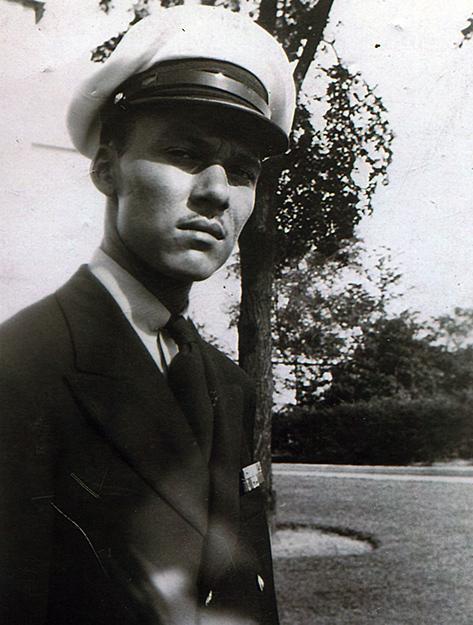
By Mary Kay Gominger
One of our own was the ‘man of the hour’ at a Christening Ceremony for the USS Truxton (DDG 103), held at Northrup Grunman in Pascagoula, Miss., on June 2.
Resident Lanier Phillips, a former crewman of the USS Truxton and now a resident at the AFRH, was a special guest at the ceremony and was recognized by the guest speaker The Honorable Gene Taylor, U.S. Representative, Mississippi, 4th District.
Congressman Taylor acknowledged how far this country and the Navy has come in providing equal opportunities to all Americans and he applauded Lanier Phillips for his continuing resolve to make things right for not only African Americans but for everyone.
There were more than 1,000 dignitaries and guests in attendance as they witnessed the historic christening of the sixth Truxton ship to bear the name of the U.S. Navy’s first captain, Commodore Thomas Truxton. The present day Truxton is the 25th Arleigh Burke Class destroyed built by Northrup Grunman at a cost of $1 billion. It is a 512 foot ship whose mission it will be to conduct sustained combat operations at sea, and it is capable of simultaneously fighting air, surface and subsurface battles. The ship will be commanded by Cmdr. Timothy R.Weber and a crew of 270.
Also in attendance was Rear Admiral Charles H. Goddard, USN, Program Executive Officer, Ships, and many dignitaries from Northrup Grunman.
Another special guest at the ceremony was His Worship Wayde Rowwell, the mayor of St. Lawrence, Newfoundland, Canada. It was just off the coast of this small mining community that the USS Truxton went aground in 1942. The entire town helped rescue the sailors and since then, they have felt a bond for this American ship and its crew members.
“We still hold a memorial service every year for those Americans that lost their lives that date so many years ago,” said His Worship Rowwell. “I am honored to be here today to take part in this historic event.”
Resident Lanier Phillips, on the day of the christening ceremony said, “This is a great day for me. To look around and see all these people here and see the fruits of some of my sacrifices…well, it is just great.”
Being part of such a celebration was something Phillips never even dreamed about as a child. Phillips was aboard the USS Truxton in 1943 when it went aground during a storm off the coast of St. Lawrence, Newfoundland, Canada, along with the supply ship Pollux. One hundred and ten crewman died in the icy elements, but Phillips, and 47 other crewmen, were saved.
“Being rescued that day changed my life,” a teary-eyed Phillips said. “And it wasn’t just being alive…it was the treatment I got from the people of that town. They treated me, for the first time in my life, just like they treated every other person rescued. The difference was – I was a black man and they were all white. They knew nothing about racism and segregation. They treated me like a person, a worthy human being, and for me, it was life-altering,” he said.
To understand the profoundness of that statement, you really have to know a little bit about Lanier Phillips’ background. He grew up in the deep south, in Lithonia, Georgia. From as early as he can remember, he was fearful for his life and for the life of his family as the Klu Klux Klan was a daily threat. The school he and his black friends attended was burned to the ground. The only thing Phillips had going for him were his dreams.
“When I got old enough to get out of town, I did,” said Phillips. “I joined the Navy. I didn’t have many other options.”
The Navy, too, had discriminatory practices back in that era so upon entrance, Phillips was assigned as a messman, the only place blacks were allowed to serve. He did this for many years. With the experience of the USS Truxton still heavy on his mind, Phillips then did the unthinkable. He applied for the Navy’s sonar school and was not immediately but eventually accepted and became the first black Navy sailor to become something more than a messman. He was a sonar technician but more important for that, he cracked open the door for all races to forge ahead and follow their dreams.
Phillips has been a resident of the AFRH for the past ____ years.
- Log in to post comments
